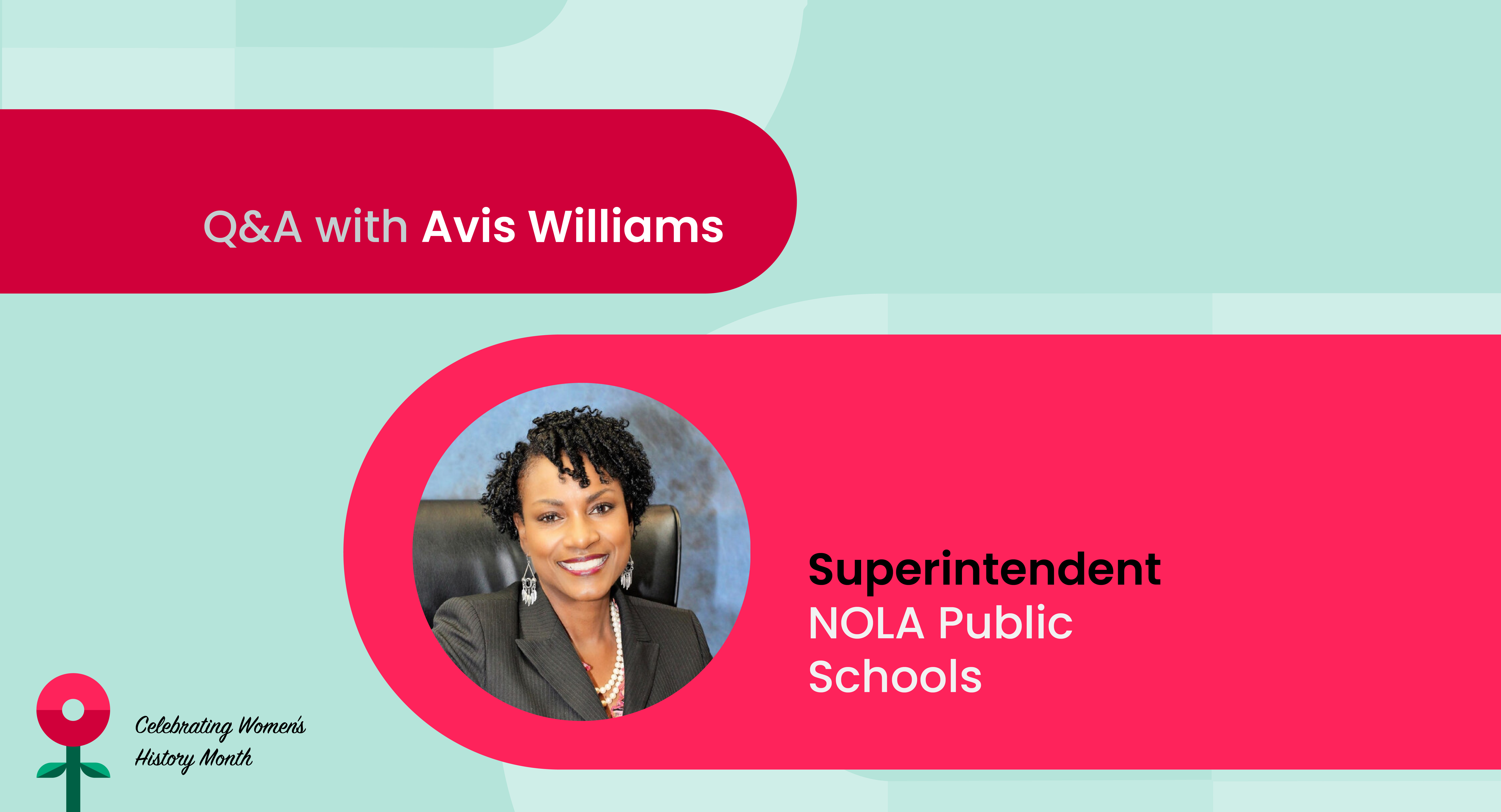Avis Williams is the superintendent of NOLA Public Schools in New Orleans, Louisiana, and a member of the ASCD Board. She is a highly committed mentor, leader, educator, and administrator who is passionate about improving instruction with community support. Williams began her administrative career in 2013 in North Carolina while also serving on the Equity Leadership Team for the state. She then led curriculum development as the assistant superintendent for Tuscaloosa City Schools in Alabama and later served as superintendent of the historic Selma City Schools, where she successfully moved the district from a state of intervention to a Tier II Performance Excellence award winner. Her outcome-driven process of education planning with community engagement led her to become the first woman permanently appointed to the role of superintendent of NOLA Public Schools.
Why do you think it is important to celebrate Women’s History Month?
Women’s History Month is a time to step back and look at the amazing accomplishments of women in history, but also to prioritize the needs that we still have for equality and equity as it relates to leveling the playing field. Whether from an income standpoint or even from the standpoint of leadership opportunities, women are sometimes overlooked. We know that the overwhelming majority of teachers are women, yet, as we rise the ranks within leadership, fewer and fewer women are represented. We can assess the progress addressed over the years, but also look at what progress still needs to be made.
Which women in history have inspired you?
There are so many amazing women in history. One that comes to mind is Effie H. Jones and part of the reason that I'm even aware of her work is that she is the namesake for a humanitarian award that I had the amazing honor of receiving through AASA, the School Superintendents Association. Jones was a pioneer in terms of helping women educators understand their value as leaders and in paving the way for women in leadership. It is important that we have mentors who understand the collective power that we have when we support each other, and who practice looking at work through an equity lens, which includes ensuring women have the same educational leadership opportunities that men have. Effie Jones did such an amazing job of that!
I also think of Mary McLeod Bethune, a trailblazer in the early 1900s who knew that education was key; she emphasized the importance of providing high-quality education for all children. I live by those guidelines and standards that she set so many years ago.
Do you have a favorite leadership quote, statement, or motto you’d like to share?
My motto or philosophy is based on my core values—to lead with equity, excellence, and joy. As a superintendent and in my work with organizations like ASCD, I try to model these values to ensure we provide opportunities for educators. Equity is one core value for me. The fact that there is a dedicated month to celebrate and look at women's history signals that we still have work to do from an equity standpoint to level the playing field and make sure that there are opportunities for all.
What is one tip you’d like to share with other women to help them become more impactful leaders?
The one tip that I would share is that it's lonely at the top only if you choose to be lonely. There are so many women out there supporting other women and so many opportunities for us to work together, learn together, and grow together. I encourage all women leaders to be mentors and to seek out a mentor or partners.
Take advantage of the collective support, energy, and power that we have as women, not only by supporting each other but by supporting young women who are future leaders within education.
This year, #EmbraceEquity is the theme for International Women's Day. How do you embrace equity in your work?
I embrace equity in my work by identifying barriers and then being intentional about removing them and improving access. When I think about our work as educators, one thing I prioritize is ensuring that we’re doing all we can for our most vulnerable families and our most vulnerable children within the community. We make this happen by looking through an equity lens, first identifying barriers and then providing access. It’s sometimes a matter of having tough conversations with ourselves, with an understanding that maybe we created the barrier in the first place. It takes being intentional to truly lead with an equity lens and to lead with equity top of mind, but it's critical that we continue making progress as women, as educators, and as leaders.
Editor’s note: This interview has been edited for space.
2023 ASCD Annual Conference
Catch Avis Williams during two separate sessions at this weekend's Annual Conference.
Saturday, April 1, 10:45 a.m. - 11:45 a.m. MDT
Leading Through Change: Critical Insights on Educational Leadership Today
Sunday, April 2, 10:45 a.m. - 11:45 a.m. MDT
Getting to Educational Equity: An Anti-Racist Roadmap to Systemic Change
Catch Avis Williams during two separate sessions at this weekend's Annual Conference.
Saturday, April 1, 10:45 a.m. - 11:45 a.m. MDT
Leading Through Change: Critical Insights on Educational Leadership Today
Sunday, April 2, 10:45 a.m. - 11:45 a.m. MDT
Getting to Educational Equity: An Anti-Racist Roadmap to Systemic Change








